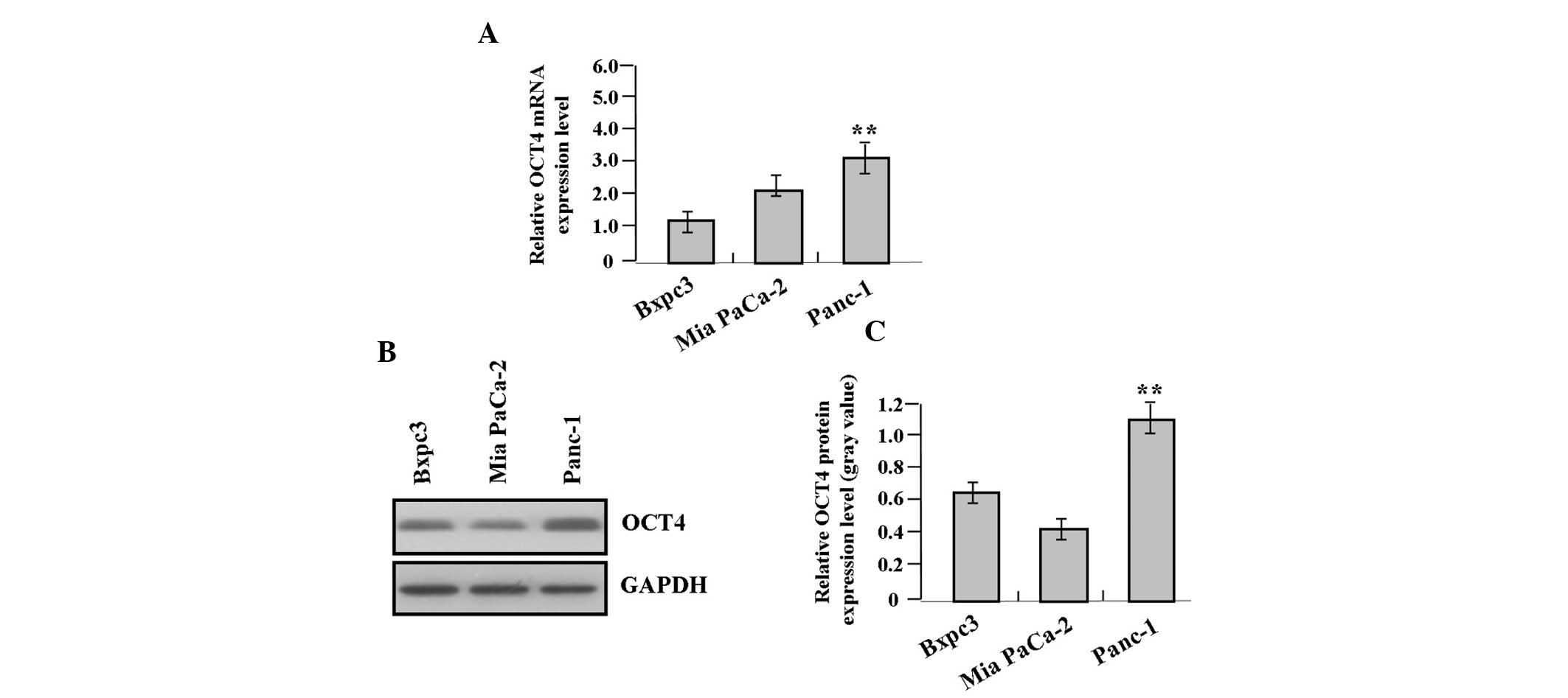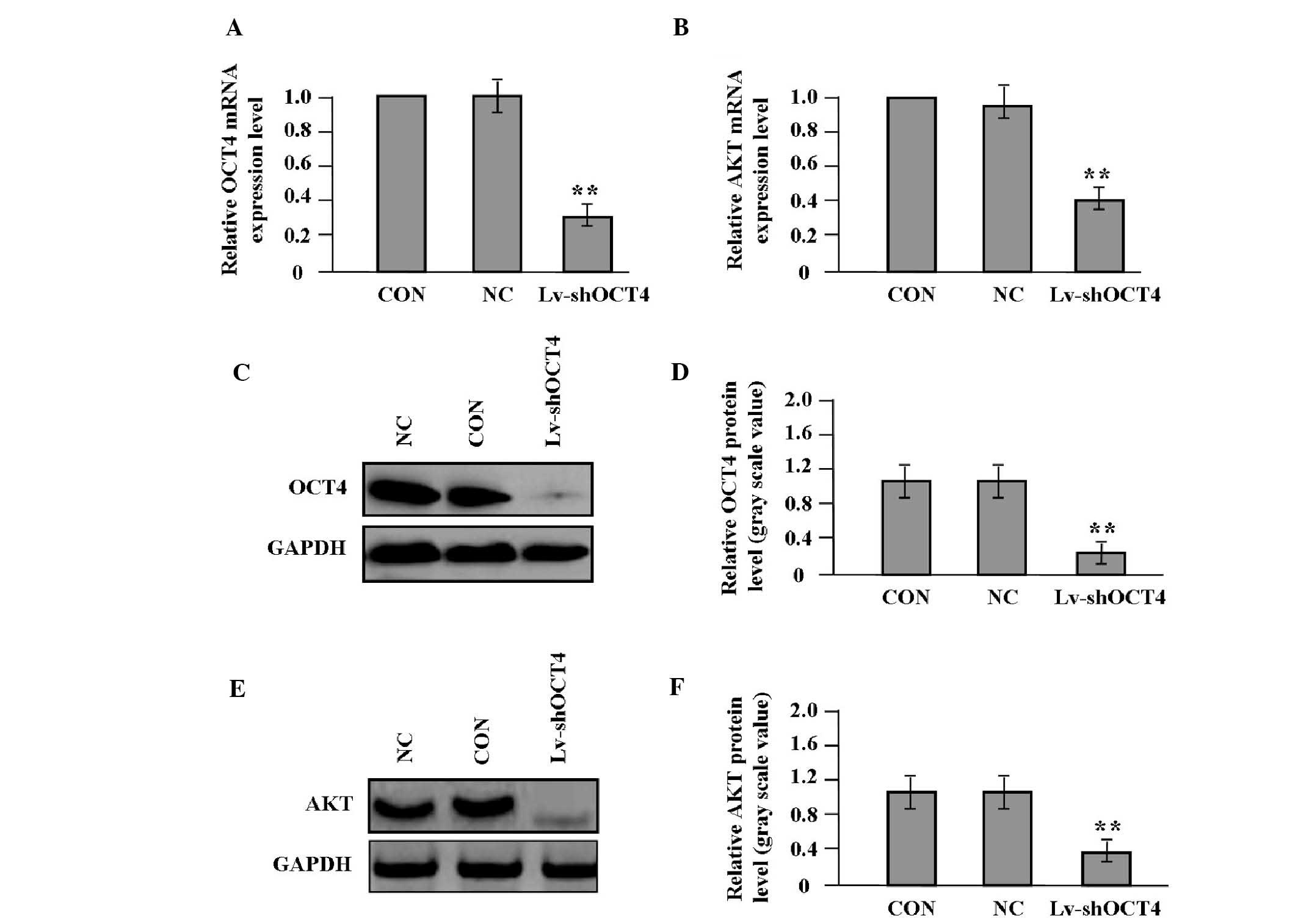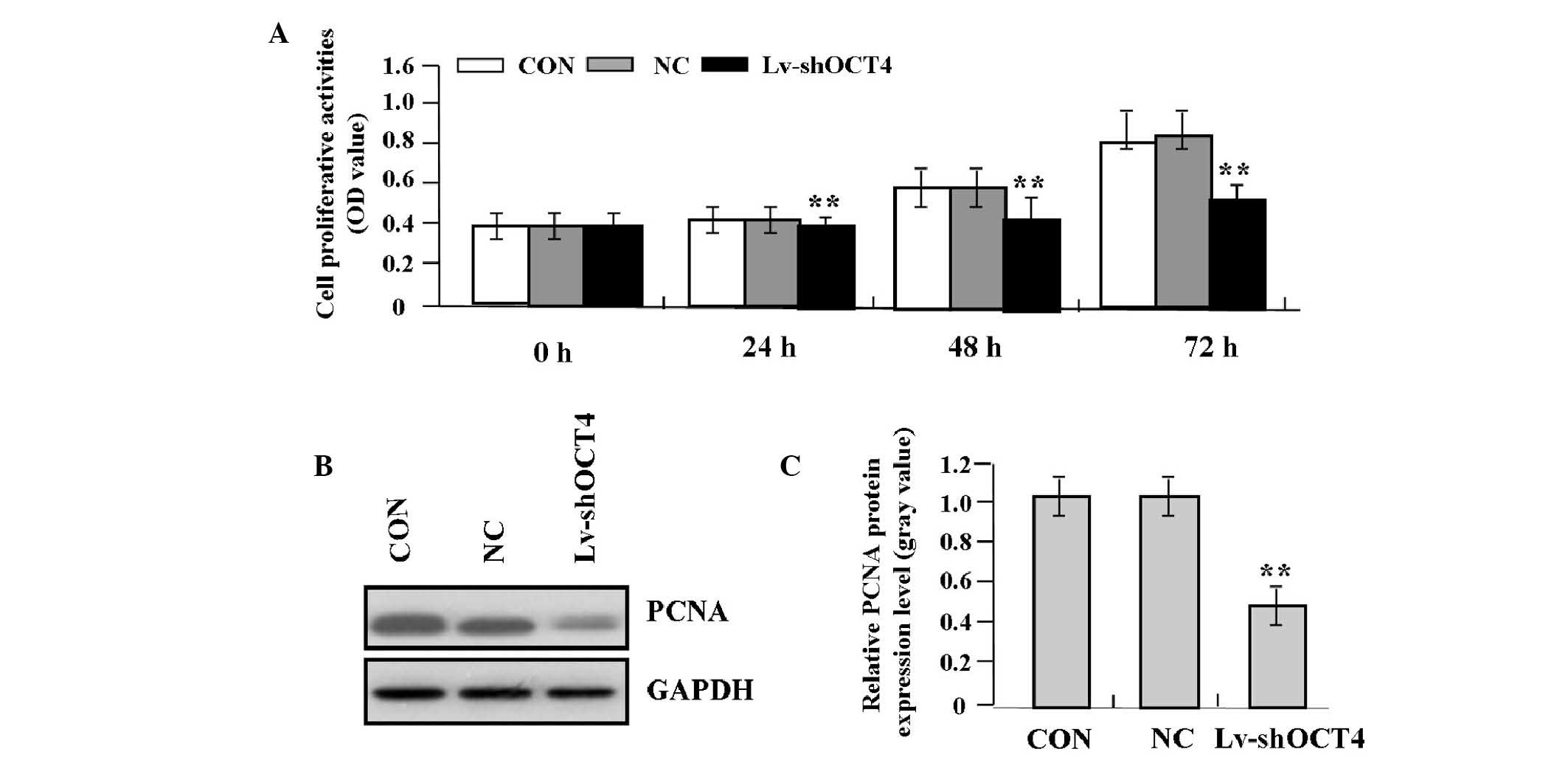|
1
|
Jemal A, Bray F, Center MM, Ferlay J, Ward
E and Forman D: Global cancer statistics. CA Cancer J Clin.
61:69–90. 2011. View Article : Google Scholar
|
|
2
|
Guo X and Cui Z: Current diagnosis and
treatment of pancreatic cancer in China. Pancreas. 31:13–22. 2005.
View Article : Google Scholar : PubMed/NCBI
|
|
3
|
Corrie P: Inspired to improve outcomes in
pancreatic cancer. Interviewed by Natasha Galukande. Future Oncol.
9:781–784. 2013. View Article : Google Scholar : PubMed/NCBI
|
|
4
|
Yin X, Li YW, Jin JJ, Zhou Y, Ren ZG, Qiu
SJ and Zhang BH: The clinical and prognostic implications of
pluripotent stem cell gene expression in hepatocellular carcinoma.
Oncol Lett. 5:1155–1162. 2013.PubMed/NCBI
|
|
5
|
Kim RJ and Nam JS: OCT4 expression
enhances features of cancer stem cells in a mouse model of breast
cancer. Lab Anim Res. 27:147–152. 2011. View Article : Google Scholar : PubMed/NCBI
|
|
6
|
Hassiotou F, Hepworth AR, Beltran AS,
Mathews MM, Stuebe AM, Hartmann PE, Filgueira L and Blancafort P:
Expression of the pluripotency transcription factor OCT4 in the
normal and aberrant mammary gland. Front Oncol. 3:792013.
View Article : Google Scholar : PubMed/NCBI
|
|
7
|
Beltran AS, Rivenbark AG, Richardson BT,
Yuan X, Quian H, Hunt JP, Zimmerman E, Graves LM and Blancafort P:
Generation of tumor-initiating cells by exogenous delivery of OCT4
transcription factor. Breast Cancer Res. 13:R942011. View Article : Google Scholar : PubMed/NCBI
|
|
8
|
Dong Z, Zeng Q, Luo H, Zou J, Cao C, Liang
J, Wu D and Liu L: Increased expression of OCT4 is associated with
low differentiation and tumor recurrence in human hepatocellular
carcinoma. Pathol Res Pract. 208:527–533. 2012. View Article : Google Scholar : PubMed/NCBI
|
|
9
|
Li X, Wang J, Xu Z, Ahmad A, Li E, Wang Y,
Qin S and Wang Q: Expression of sox2 and oct4 and their clinical
significance in human non-small-cell lung cancer. Int J Mol Sci.
13:7663–7675. 2012. View Article : Google Scholar : PubMed/NCBI
|
|
10
|
Hatefi N, Nouraee N, Parvin M, Ziaee SA
and Mowla SJ: Evaluating the expression of oct4 as a prognostic
tumor marker in bladder cancer. Iran J Basic Med Sci. 15:1154–1161.
2012.PubMed/NCBI
|
|
11
|
Jia Q, Zhang X, Deng T and Gao J: Positive
correlation of Oct4 and ABCG2 to chemotherapeutic resistance in
CD90(+)CD133(+) liver cancer stem cells. Cell
Reprogram. 15:143–150. 2013.PubMed/NCBI
|
|
12
|
Izumiya M, Kabashima A, Higuchi H, et al:
Chemoresistance is associated with cancer stem cell-like properties
and epithelial-to-mesenchymal transition in pancreatic cancer
cells. Anticancer Res. 32:3847–3853. 2012.PubMed/NCBI
|
|
13
|
Kosaka T, Nagamatsu G, Saito S, Oya M,
Suda T and Horimoto K: Identification of drug candidate against
prostate cancer from the aspect of somatic cell reprogramming.
Cancer Sci. 104:1017–1026. 2013. View Article : Google Scholar : PubMed/NCBI
|
|
14
|
Yang S, Zheng J, Ma Y, Zhu H, Xu T, Dong K
and Xiao X: Oct4 and Sox2 are overexpressed in human neuroblastoma
and inhibited by chemotherapy. Oncol Rep. 28:186–192.
2012.PubMed/NCBI
|
|
15
|
Linn DE, Yang X, Sun F, Xie Y, Chen H,
Jiang R, Chen H, Chumsri S, Burger AM and Qiu Y: A role for OCT4 in
tumor initiation of drug-resistant prostate cancer cells. Genes
Cancer. 1:908–916. 2010. View Article : Google Scholar : PubMed/NCBI
|
|
16
|
Schreiber C, Kuch V, Umansky V and Sleeman
JP: Autochthonous mouse melanoma and mammary tumors do not express
the pluripotency genes Oct4 and Nanog. PLoS One. 8:e574652013.
View Article : Google Scholar : PubMed/NCBI
|
|
17
|
Padín-Iruegas ME, Herranz-Carnero M,
Aguin-Losada S, Brozos-Vazquez E, Anido-Herranz U, Antunez-Lopez
JR, Ruibal-Morell A and López-López R: Prognostic value of changes
in the expression of stem cell markers in the peripheral blood of
patients with colon cancer. Oncol Rep. 29:2467–2472.
2013.PubMed/NCBI
|
|
18
|
Liu YH, Li Y, Liu XH, et al: A signature
for induced pluripotent stem cell-associated genes in colorectal
cancer. Med Oncol. 30:4262013. View Article : Google Scholar : PubMed/NCBI
|
|
19
|
Yasuda H, Tanaka K, Okita Y, et al: CD133,
OCT4, and NANOG in ulcerative colitis-associated colorectal cancer.
Oncol Lett. 2:1065–1071. 2011.PubMed/NCBI
|
|
20
|
Li C, Yan Y, Ji W, Bao L, Qian H, Chen L,
Wu M, Chen H, Li Z and Su C: OCT4 positively regulates survivin
expression to promote cancer cell proliferation and leads to poor
prognosis in esophageal squamous cell carcinoma. PLoS One.
7:e496932012. View Article : Google Scholar : PubMed/NCBI
|
|
21
|
He W, Li K, Wang F, Qin YR and Fan QX:
Expression of OCT4 in human esophageal squamous cell carcinoma is
significantly associated with poorer prognosis. World J
Gastroenterol. 18:712–719. 2012. View Article : Google Scholar
|
|
22
|
de Resende MF, Chinen LT, Vieira S,
Jampietro J, da Fonseca FP, Vassallo J, Campos LC, Guimarães GC,
Soares FA and Rocha RM: Prognostication of OCT4 isoform expression
in prostate cancer. Tumour Biol. 34:2665–2673. 2013.PubMed/NCBI
|
|
23
|
Al-Marzoqee FY, Khoder G, Al-Awadhi H,
John R, Beg A, Vincze A, Branicki F and Karam SM: Upregulation and
inhibition of the nuclear translocation of Oct4 during multistep
gastric carcinogenesis. Int J Oncol. 41:1733–1743. 2012.PubMed/NCBI
|
|
24
|
Luo W, Li S, Peng B, Ye Y, Deng X and Yao
K: Correction: embryonic stem cells markers SOX2, OCT4 and Nanog
expression and their correlations with epithelial-mesenchymal
transition in nasopharyngeal carcinoma. PLoS One. 8:e563242013.
View Article : Google Scholar
|
|
25
|
Borrull A, Ghislin S, Deshayes F, Lauriol
J, Alcaide-Loridan C and Middendorp S: Nanog and Oct4
overexpression increases motility and transmigration of melanoma
cells. J Cancer Res Clin Oncol. 138:1145–1154. 2012. View Article : Google Scholar : PubMed/NCBI
|
|
26
|
Cao L, Li C, Shen S, et al: OCT4 increases
BIRC5 and CCND1 expression and promotes cancer progression in
hepatocellular carcinoma. BMC Cancer. 13:822013. View Article : Google Scholar : PubMed/NCBI
|
|
27
|
Dai X, Ge J, Wang X, Qian X, Zhang C and
Li X: OCT4 regulates epithelial-mesenchymal transition and its
knockdown inhibits colorectal cancer cell migration and invasion.
Oncol Rep. 29:155–160. 2013.PubMed/NCBI
|
|
28
|
Zhang Y, Zhang X, Wang X, Gan L, Yu G,
Chen Y, Liu K, Li P, Pan J, Wang J and Qin S: Inhibition of LDH-A
by lentivirus-mediated small interfering RNA suppresses
intestinal-type gastric cancer tumorigenicity through the
downregulation of Oct4. Cancer Lett. 321:45–54. 2012. View Article : Google Scholar
|
|
29
|
Chen B, Xue Z, Yang G, Shi B, Yang B, Yan
Y, Wang X, Han D, Huang Y and Dong W: Akt-signal integration is
involved in the differentiation of embryonal carcinoma cells. PLoS
One. 8:e648772013. View Article : Google Scholar : PubMed/NCBI
|
|
30
|
Lin Y, Yang Y, Li W, et al: Reciprocal
regulation of Akt and Oct4 promotes the self-renewal and survival
of embryonal carcinoma cells. Mol Cell. 48:627–640. 2012.
View Article : Google Scholar : PubMed/NCBI
|
|
31
|
Campbell PA and Rudnicki MA: Oct4
interaction with Hmgb2 regulates Akt signaling and pluripotency.
Stem Cells. 31:1107–1120. 2013. View Article : Google Scholar : PubMed/NCBI
|
|
32
|
Xu C, Hu DM and Zhu Q: eEF1A2 promotes
cell migration, invasion and metastasis in pancreatic cancer by
upregulating MMP-9 expression through Akt activation. Clin Exp
Metastasis. 30:933–944. 2013. View Article : Google Scholar : PubMed/NCBI
|



















